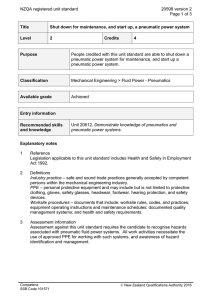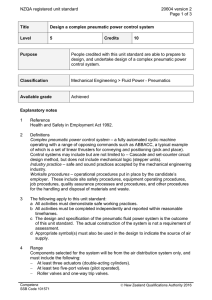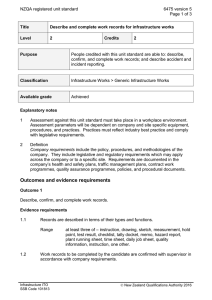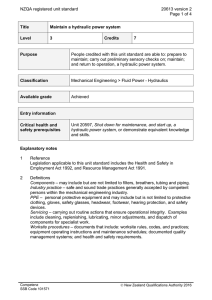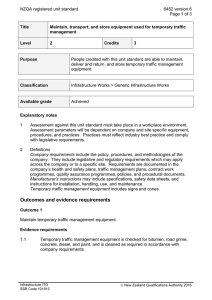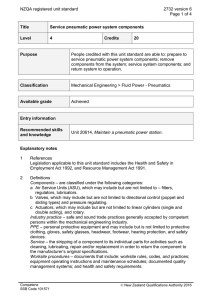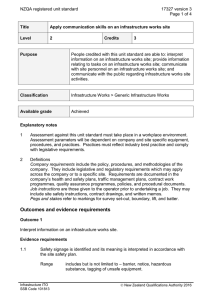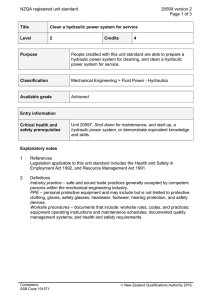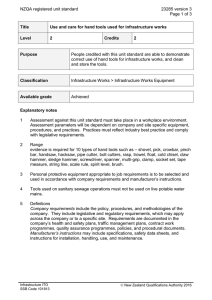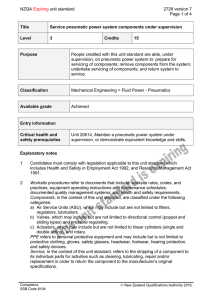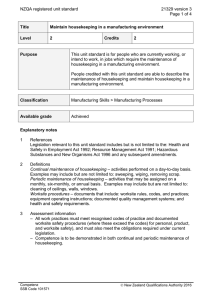NZQA registered unit standard 20614 version 2 Page 1 of 4
advertisement
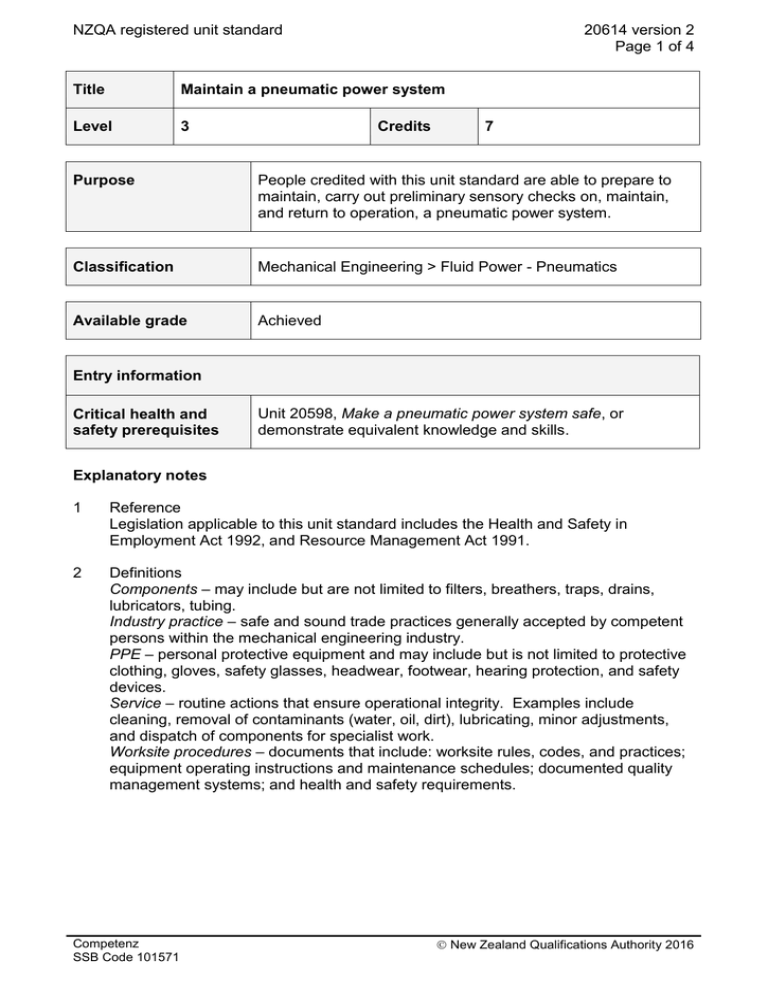
NZQA registered unit standard 20614 version 2 Page 1 of 4 Title Maintain a pneumatic power system Level 3 Credits 7 Purpose People credited with this unit standard are able to prepare to maintain, carry out preliminary sensory checks on, maintain, and return to operation, a pneumatic power system. Classification Mechanical Engineering > Fluid Power - Pneumatics Available grade Achieved Entry information Critical health and safety prerequisites Unit 20598, Make a pneumatic power system safe, or demonstrate equivalent knowledge and skills. Explanatory notes 1 Reference Legislation applicable to this unit standard includes the Health and Safety in Employment Act 1992, and Resource Management Act 1991. 2 Definitions Components – may include but are not limited to filters, breathers, traps, drains, lubricators, tubing. Industry practice – safe and sound trade practices generally accepted by competent persons within the mechanical engineering industry. PPE – personal protective equipment and may include but is not limited to protective clothing, gloves, safety glasses, headwear, footwear, hearing protection, and safety devices. Service – routine actions that ensure operational integrity. Examples include cleaning, removal of contaminants (water, oil, dirt), lubricating, minor adjustments, and dispatch of components for specialist work. Worksite procedures – documents that include: worksite rules, codes, and practices; equipment operating instructions and maintenance schedules; documented quality management systems; and health and safety requirements. Competenz SSB Code 101571 New Zealand Qualifications Authority 2016 NZQA registered unit standard 20614 version 2 Page 2 of 4 Outcomes and evidence requirements Outcome 1 Prepare to maintain a pneumatic power system. Evidence requirements 1.1 Filter types are described in terms of their function and location within a pneumatic power system. Range 1.2 Routine preventive maintenance activities are described in accordance with the selected system and worksite procedures. Range 1.3 three consequences are required. Tools and equipment are prepared in accordance with the selected system and industry practice. Range 1.5 may include but is not limited to – system cleaning, filter checks. Consequences of a poorly maintained system are identified. Range 1.4 may include but is not limited to – main line, air service, oil removal, odour removal. may include but is not limited to – containers, blanking flanges, plates and plugs, absorbent materials, hand tools, cleaning equipment and solvents. Procedure for making system safe is established in accordance with industry practice prior to commencing maintenance. Outcome 2 Carry out preliminary sensory checks on a pneumatic power system. Range sensory – sight, sound, touch, smell; checks may include but are not limited to – leaks, tube condition, filters, couplings, temperatures, gauges and indicators, excessive or unusual noise, machine odour. Evidence requirements 2.1 Checks are carried out in accordance with health and safety legislation and industry practice, and results communicated to the supervisor. Competenz SSB Code 101571 New Zealand Qualifications Authority 2016 NZQA registered unit standard 20614 version 2 Page 3 of 4 Outcome 3 Maintain a pneumatic power system. Evidence requirements 3.1 System is made safe in accordance with worksite procedures and confirmed with supervisor. Range may include but is not limited to – isolation, depressurisation, PPE, safety supports. 3.2 Components to be serviced are confirmed with supervisor. 3.3 Components are removed without damage to the system or component. 3.4 Components are serviced in accordance with manufacturer’s instructions or industry practice. 3.5 Components are replaced without damage to the system or component. Outcome 4 Return a pneumatic power system to operation. Evidence requirements 4.1 System is re-energised in accordance with worksite procedures and confirmed with supervisor. Range may include but is not limited to – electrical, mechanical, and potential energy. 4.2 System performance is verified with supervisor to ensure it meets operational requirements. 4.3 Work area is cleaned in accordance with legislative requirements and industry practice. Replacement information This unit standard and unit standard 20613 replaced unit standard 2722. Planned review date 31 December 2015 Competenz SSB Code 101571 New Zealand Qualifications Authority 2016 NZQA registered unit standard 20614 version 2 Page 4 of 4 Status information and last date for assessment for superseded versions Process Version Date Last Date for Assessment Registration 1 25 May 2004 31 December 2014 Review 2 18 March 2011 N/A Accreditation and Moderation Action Plan (AMAP) reference 0013 This AMAP can be accessed at http://www.nzqa.govt.nz/framework/search/index.do. Please note Providers must be granted consent to assess against standards (accredited) by NZQA, or an inter-institutional body with delegated authority for quality assurance, before they can report credits from assessment against unit standards or deliver courses of study leading to that assessment. Industry Training Organisations must be granted consent to assess against standards by NZQA before they can register credits from assessment against unit standards. Providers and Industry Training Organisations, which have been granted consent and which are assessing against unit standards must engage with the moderation system that applies to those standards. Consent requirements and an outline of the moderation system that applies to this standard are outlined in the Accreditation and Moderation Action Plan (AMAP). The AMAP also includes useful information about special requirements for organisations wishing to develop education and training programmes, such as minimum qualifications for tutors and assessors, and special resource requirements. Comments on this unit standard Please contact Competenz qualifications@competenz.org.nz if you wish to suggest changes to the content of this unit standard. Competenz SSB Code 101571 New Zealand Qualifications Authority 2016
